SAINT CHARLES DE FOUCAULD
7. Nazareth : The Last Place (1897-1898)
THE POOR MAN OF NAZARETH.
Here is our Brother Marie-Albéric released from his vows as a Trappist monk. Without delay, He sets off for the Holy Land. Madame Castillon du Perron gives a very picturesque description of his arrival at Nazareth:
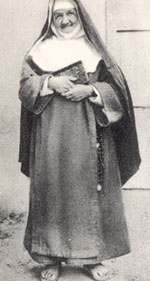
«“ Oh, he’s a good boy” declared the chaplain to the Poor Clares at Nazareth, speaking of the convent’s new domestic servant, “but not the most intelligent.” In fact, why worry about Brother Charles’s odd ways, seeing that he does no harm to anyone and gives the sisters an opportunity to do good! His arrival was very strange, on the 6th March 1897. At dawn, at the time of the first Mass, a European disguised as a fakir or a fellah entered the chapel where the Blessed Sacrament was exposed all day long, and plunged into prayer, with his eyes riveted on the altar. The extern sister, used to all sorts of visitors, would not have noticed him but for his unusual clothing. Still young, with a sombre but fiery look in his eyes, his hair was tousled and his feet, shod in strapped sandals, were bare and dirty. He was wearing a white skull cap wrapped round with a woollen scarf of the same colour. Over his blue cloth trousers, he wore a blue and white striped hooded smock. From his leather belt there hung a large brown beaded rosary. Af-ter Mass, he stayed put. At 11 o’clock in the morning, when the bell rang for dinner, he still remained motionless in his place ; he urged the sister to go and eat, telling her that he would stay to pray. Was he a madman or a robber ? Left alone, would not he steal the monstrance and run off with it ? Not daring to turn him out, the sister made as though to retire but stayed to keep an eye on him. He ended by getting up and leaving. They would have forgotten all about him had he not reappeared three days later, sent, he said, by the chaplain to the Franciscans, Father Marie-Gabriel Voisin, and asking to speak with the Reverend Mother Abbess », Marie-Ange of Saint Michael.
Normally circumspect, she had no hesitation in receiving him. Better still, she who had no need of anyone, still less a vagabond, employed him there and then. They offered him the house inside the cloister that had been occupied by the gardener, but he refused to accept it. For him, it was too big and too grand. They ended by installing him in a tool shed, adjacent to the convent wall, situated in an enclosure with a view over the countryside. Once the shed had been emptied out, they brought him some trestles, some planks and a mattress.» (p. 239)
He immediately dedicated this “wooden cabin” to Our Lady of Perpetual Succour, to Whom he had prayed so much during his decisive retreat in Rome.
«Brother Charles was exhausted and did not even have the strength to climb onto his bed. He had to be helped. He was then provided with a little table, a stool and, by way of blanket, a woollen cover stuffed with rags.» (ibid., p. 240)
On the 22nd March, he wrote to Marie de Bondy :
«I am settled at Nazareth... The Good God has found me a place here, as perfect as could be. It is what I was looking for: poverty, solitude, abjection, very menial work, complete obscurity, a near perfect imitation of how Our Lord Jesus lived in this same Nazareth... I have embraced here the humble and obscure existence of God, the workman of Nazareth.» (Frère Charles de Jésus, “Œuvres sprituelles, Anthologie”, éditions du Seuil, 1958, p. 32)
A blinding epitome: God, the workman of Nazareth! And on the 24th April, he wrote to his brother-in-law this letter which sums up his life :
« I left the Trappists, after receiving a full dispensation from my vows, in order to find in another form of life what I had looked for among the Trappists, without finding it : abjection, poverty and the humble manual work of Our Lord – in other words, the imitation of Our Lord in His life at Nazareth. I love and esteem the Trappists : I have left behind religious whom I love dearly [...]. But the Trappist monastery does not have this love of poverty, and does not offer manual work to this degree, nor does it offer the abjection of the poor worker of Nazareth. I came, therefore, to bury myself here, to hide myself, to be a worker, to earn my living by my work as Our Lord Jesus did : to live by menial work (for as long as the Good God gives me the health and the strength to do so), and then by charity, as He did. I am absolutely certain that I shall never want for anything [...].
«Having arrived here without knowing any profession, with no qualifications, with no papers other than my passport, on the sixth day I not only found the wherewithal to earn my living but to do so under such conditions as I had dreamed of for years. One could say that this place was waiting for me: in fact, it was waiting for me, for nothing happens by chance and everything that is done has been prepared by God.
«I am a domestic servant, an odd-job man, for a poor religious community [...].
«Immediately after receiving dispensation from my vows as a Trappist, I placed my hands in those of my confessor (a Trappist of Rome) and made the two following vows (for it is good to be chained to our Spouse Jesus, by every possible chain): 1o) A vow of perpetual chastity, 2o) A vow of never possessing or using more than would be possessed or used by a poor workman.»
He ends his letter thus:
«If anybody asks you, never say where I am... I am hidden, buried, dead to all that is of this world... but more than ever united to you, my dear friend, for the more one is united to God, the more one is united to those whom He loves more than any human heart can love.»
(to Raymond de Blic, 24 April 1897, Archives)
A few months later, he will write to Father Huvelin confirming his happiness:
«The life I have here is what I have been dreaming of for eleven years; it is the life for which I rejected Solesmes, for which I entered the Trappist monastery, hoping to find it there, but having failed to find it, for which I came out... and certainly my departure from the Trappists and my establishment here have been too providential in their circumstances for me not to see them, together with my constant aspiration, as the work of God, the expression of His will, and a formal vocation [...].
«Thank our dearest Father with me, and pray for me... And write to me... You see the good your letters do me... It is through you, dear Father, that the good God continues to save me!... Many many thanks to Him and to you!...
«Bless your little child who venerates you and who loves you as a son in the Heart of our beloved Jesus.
Brother Charles de Jesus.» (Père de Foucauld - Abbé Huvelin, Correspondance inédite, p. 112)
HIS EVERYDAY LIFE.
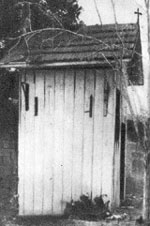
«He rises at dawn or even earlier, having decided to jump out of bed as soon as he wakes from his first sleep. He prays until the Angelus, which he goes to hear at the Franciscans. Staying with them, he then goes down to the cave where the house of the Holy Family once stood. Masses follow one after the other while he says his rosary. At 6 o’clock, he returns to the Poor Clares, where he prepares the sacristy and the chapel before serving Mass at 7 o’clock. Each day, as encouraged by Father Huvelin, he receives Communion. Once a week he makes his confession to Father Voisin.
«After Mass, he starts work until 5 o’clock in the evening when there is Benediction of the Blessed Sacrament. He nevertheless interrupts work twice for half an hour: a half an hour before the morning collation and at about 3 o’clock in the afternoon to read the offices of Sext, None and Vespers. After Benediction, he stays in the chapel until half past seven, then retires to his cabin where he eats a little without ceasing to read. At 9 o’clock, he lies down, but very often, and more and more frequently, he forgoes his rest in order to slip like a robber towards the convent chapel, the keys of which have been entrusted to him by Mother Abbess. There, ignored by all, he kneels down at the foot of the Blessed Sacrament and prays.
«The nuns give him the task of picking over the lentils, peeling vegetables, sweeping the chapel, running errands and fetching the mail twice a week. Acquitting himself eagerly of these menial tasks, he seems not to notice their insignificance and spends all his free time in his cabin or in the chapel. The nuns now find it natural to let him serve Mass and to fulfil the role of sacristan, as well as to receive the holy pictures he draws and colours for them», like this copy of a fifteenth century Cretan painting, representing Our Lady of Perpetual Succour (cf. following page).
«They are troubled, however, by his excessive austerities and they worry about him. Dressed like a pauper, he hardly has a spare set of clothes. Furthermore, he eats very little and hardly sleeps. The meagre food provided by the Convent seems over abundant to him; he measures it out sparingly, and the figs and almonds added on Sundays he distributes to the children of the village. He refuses to have a pillow and, in the rare moments when he rests, he places his head on a stone. At night, when he is not in adoration in the chapel, he writes for hours by candlelight in his cabin.» (Castillon, p. 241)
FIORIETTI.
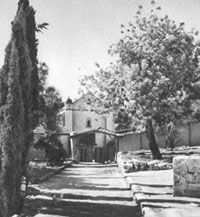
«A rifle. As he once knew how to use a rifle! One day, a jackal started to roam around the Poor Clares’ Convent of Jerusalem, where he lived. Every night, the beast slaughtered a number of chickens, threatening the sisters with ruin. Naturally, he offered to kill it. Sitting and watching behind a tree, he waited for the twilight when the animal would get in through a gap in the wall. He was on the alert and would not miss. Then suddenly, without knowing how or why, he was lost in his rosary and let the animal pass without seeing it.
«One evening, he was approached by some bandits. They had nothing to wear, so he immediately shared with two of them his only coat, then catching sight of his spare blue tunic hanging from a nail, which the sisters had given him, despite his Rule, and had made him accept, he gave it to the third.
«And yet, he is still able to fight. One day, some passers-by rang at the Convent gate to ask for provisions and money. The nuns gave them what they had, which was almost nothing. In their fury, they threatened the lay sister and her companions. He intervened, swung them over his shoulder without saying a word, and roughly threw them to the ground. After which, he ordered them to be off.
«A Salesian lay brother, who had come to question him, was shown out. You will excuse me, but many things are said about you. I would like to know whether they are true.
– What for ?
– They say that you held a good position in France.
– What position ?
– That of count.
«And smiling casually, Charles answered :
– I am an old soldier. » (Castillon, p. 251)
A TREASURE OF SPIRITUALITY.
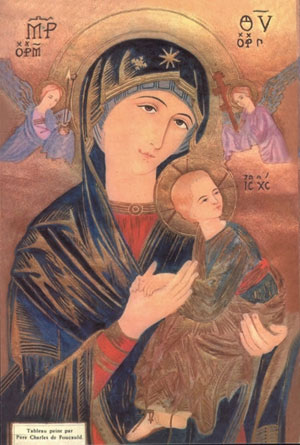
The greater part of Charles de Foucauld’s spiritual writings date from this period. Initially there are meditations, mostly on the Gospel, retreat notes, and considerations on liturgical feasts :
- He wrote to Father Jerome on the 15th February 1898;
«On leaving Rome, I did not wish to write anything more... But I found myself in such a state of dryness... feeling it impossible to pray, that I asked my director whether I should continue not to write or whether I should resume my written meditations: He answered me: “Write down your meditations: it is a very good way of meditating; and it is particularly good for you since it helps to fix your thoughts.” So I wrote every evening. You will find some difference between these meditations and the others. These meditations are mostly prayers, familiar conversations with the divine Spouse of our souls; I tell Him everything that I have to tell Him... It is very intimate...» (Lettres à mes frères de la Trappe, Le Cerf, 1969, p. 138)
Father Huvelin certainly did not imagine that in less than three years his spiritual son would fill, with his beautiful handwriting, more than three thousand exercise-book pages!
Every day for a year, he wrote his “Considerations sur les fêtes de l’année”:
«So as to recite better the divine office, the prayer of the Church - to better celebrate the feasts of the Church - to be better united in mind with this beloved Church, Your Spouse, - and thus with the mind of the heavenly Jerusalem by honouring still more its holy inhabitants.»
But the mysteries of Jesus will soon overtake the life of the saints!
He reads a lot, and continues to study dogmatic theology. He has three favourite authors : Saint Teresa of Avila, Saint John of the Cross and Saint John Chrysostom. From the first, he learned the passionate love of the Lord; from the second, the sense of total renunciation and of faith in the efficacy of the Cross. And perhaps he was even more marked by the realism of Saint John Chrysostom’s evangelical homilies. For, going to the source, he fed primarily and especially on the Gospel. For the hermit of Nazareth, the essential is to know and to love Jesus :
« What must always dominate in prayer is love. »
It is in order to pray that he writes. His pen simply follows his heart. His meditations bring Jesus to life, making Him say :
« Live as Saint Magdalene would have lived with Me at Nazareth. »
He made for himself a portrait of Our Lord, formed of phrases from the Gospel :
« Since then, I re-read it ceaselessly and I love to have this portrait before my eyes daily. »
He entitled it The Unique Model. The year 1898 will see the exposition of the Holy Shroud at Turin, and the discovery of the portrait of Our Lord, imprinted on this holy Relic, by means of photography. Father Jerome sent a reproduction to Brother Charles, who thanked him in these enthusiastic terms: «Nazareth, 8 May 1898.
«My very dear Father,
Thank you for your very good letter of the 5th April, and for the very precious souvenirs accompanying it: this pious orange leaf, and this wonderful reproduction of the Holy Shroud: this photograph is a treasure, a real portrait of our Beloved. I cannot thank you enough for it: it is a true and most precious relic! Thank you a thousand times! » (Lettres à mes frères de la Trappe, p. 156)
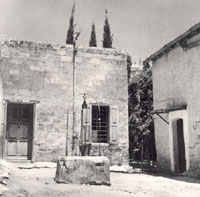
He is absolutely happy. There is no longer the peace and consolation experienced with the Trappists, but an extraordinary flowering of his spirituality, an explosion of charisms: it reminds one of a mystical marriage, even from that period.
Jesus loves him. He wishes to love Jesus. He never ceases meditating on this love of Jesus, ceaselessly seeking to show Him more love in return: they are like the outpourings of a lover for his betrothed, with great magnificence. And even when nothing springs from his heart, he remains close to Jesus, willingly riveted to this Presence in the Blessed Sacrament. For his exultation is in the faith, and his love is in his will:
«I am happy because I imitate my Master and because I do His Will.»
Though he certainly received great mystical graces at that time, his soul did not always enjoy perceptible consolation. This is what he wrote on the day of Pentecost :
« My God, what is it that displeases You most in my soul? I am lacking in the spirit of prayer, confidence in You, gentleness, fidelity, generosity. Jesus is not pleased with me. Dryness and darkness, everything is painful to me; Holy Communion, prayer, everything, everything, even telling Jesus that I love Him. I must cling on to the life of faith! If only at least I felt that Jesus loves me. But He never tells me that. What I lack most is self-forgetfulness and a brotherly heart for others. » (June 1897, écrits spirituels de Charles de Foucauld, 1937, p. 170-171)
How pregnant this text is with meaning! It reveals the price to pay for peace and joy. Peace and joy are not dependent on perceptible impressions but are the effects of love, based on the certitude that he is living in the place dearest to the Heart of Jesus and that he is doing the will of Him Whom he loves. The consequence of this very pure prayer is constant union with Jesus, for Whose love he does all things, applying himself to imitating Him.
RETREAT AT NAZARETH.
From the 5th to the 15th November 1897, he makes a retreat. His aim:
«1o) to know God better, the better to love Him, 2o) to know His Will better, the better to do it.»
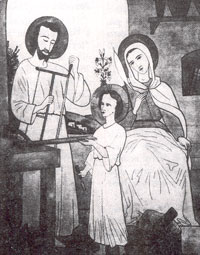 After having meditated on the perfections of God and of His presence, he goes through the whole life of Jesus, from His Incarnation to His life in the Eucharist and in the Church. And Charles de Foucauld discovers his essential vocation in resemblance to his Master. He then goes over his past life, his sins and God’s mercy, in the magnificent text we already quoted last month (CRC no 292, p. 21-23)
After having meditated on the perfections of God and of His presence, he goes through the whole life of Jesus, from His Incarnation to His life in the Eucharist and in the Church. And Charles de Foucauld discovers his essential vocation in resemblance to his Master. He then goes over his past life, his sins and God’s mercy, in the magnificent text we already quoted last month (CRC no 292, p. 21-23)
After meditating on the virtues, he ends his retreat by taking resolutions confirming him in his vocation:
«Resolutions. Become more and more established in my life as though it were necessary never to leave it: consider this blessed life, the hidden life of Jesus at Nazareth, in its most exact likeness, as being my vocation and the state in which God wishes to me to be until my death (and what a happy, blessed and fortunate state!)... To do everything that I think He did; to do nothing that I think He never did...To accept from my mothers what He received from His... to be for my mothers the model son as He was for the Blessed Virgin... Not to let myself be worried, disturbed by uncertainties, doubts over little things, insignificant questions of external details [...].
«I must imitate the life of Jesus both inwardly and outwardly, mindful that the interior life, that is to say, the life of prayer, always looking towards Heaven, is by far the principal and most important life: “Omnis gloria reginæ ab intus”... At Nazareth Jesus glorified God and sanctified men infinitely more by His inner life, His prayers, than by His outer life, most holy though it was. Likewise, no matter how holy our external life may be, God is much less glorified by it than He is by our inner life... which is especially true for those who are not given to the life of evangelisation. Not to allow myself to be diverted from great things by immaterial small details. My vocation is the life of Jesus at Nazareth, which is to be a model son for the Most Blessed Virgin, Whom I see in my mothers [the Poor Clares] it is even more to be a model son for God.
«To bring myself, in this hidden life of Jesus, to take the means to possess it fully and to bury myself therein more and more. And once the outlined canvas is completed, only to concern myself with perfecting the inner man.» (8 November 1897, La dernière place, p. 114-115)
For the moment, he considers Nazareth to be his definitive place, whilst ready to leave this blessed place as soon as God’s Will calls him elsewhere:
«Must one stick to being at Nazareth? No, no more than for anywhere else. Stick to nothing except the Will of God, to God alone...»
«I should find that it is a great grace to live at Nazareth. As soon as it ceased to be the will of God, I should have to throw myself headlong, without a backward glance, to wherever or whatever His Will calls me.»
TO SUFFER WITH JESUS AND TO DESIRE MARTYRDOM.
Considering Jesus as his only Master, wishing to love and imitate Him, he also wishes to follow Him in his death and burial. The Communion whereby he unites himself daily with the death and resurrection of Jesus radiates through every moment of his life.
In a meditation on the last prayer of Jesus: « Father, into Your hands I commend My spirit» (Luke 23. 46), he writes:
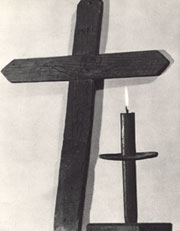
«This is the last prayer of our Master, of our Beloved... May it be ours... And let it be our prayer not only in our last moment but in our every moment: “Father, into Your hands I commend my spirit; Father, I abandon myself to You, I entrust myself to You; Father, do with me whatever shall please You; for whatever You do with me I thank You; thank You for everything, I am ready for all ; I accept all; I thank You for everything; provided that Your Will be done in me, my God, provided that Your Will be done in all Your creatures, in all Your children, for all those loved by Your Heart. I desire nothing else, my God; I commend my soul into Your hands; I give it to You, my God, with all the love of my heart, because I love You, and because it is a necessity of love for me to give myself, to place myself in Your hands without measure; I commit myself into Your hands with infinite trust, for You are my Father”... » (Lettres et carnets, Seuil, “Livre de Vie”, 1966, p. 118)
Our Father has made this prayer our own. It is the prayer we recite every day after Mass as our act of thanksgiving. Hidden and buried with Christ, Brother Charles de Jesus unites himself with His immolation through partaking in the Eucharistic Mystery. He often meditates on the Sacrifice and comes back to these words of Jesus: «If the grain of wheat does not die...» He desires to suffer with Jesus and to save souls with Him:
«This law of the Cross, he wrote on the 4th April 1898 in the Considerations, this law, that we can only do good for others on condition that we gain them for God, that we give birth to them for God through our own suffering, our own crucifixion, is so general and so absolute, that the Saviour, Whose every act was of infinite merit, Who had every grace in His hands, Who could do all the good He wanted for souls without suffering Himself, still wanted to submit to and embrace the law of suffering to the extent of being more completely crucified than any man can ever be.» (p. 274)
Enkindled with love for Jesus, Brother Charles de Jesus desires a greater conformity with his Beloved:
«Imitation is inseparable from love, he writes to Gabriel Tourdes. Whoever loves wishes to imitate; that is the secret of my life. I have lost my heart to this JÉSUS of Nazareth crucified 1900 years ago, and I spend my time trying to imitate Him as much as my weakness allows.» (Charles de Foucauld, Lettres à un ami de Lycée, Paris, 1982, p. 159)
So, more than suffering, he asks for the grace of martyrdom. Already in 1896, at the time of the massacre of the Armenian Catholics, he had ardently desired to die with them, and since then, this thought never left him and will never leave him until the end. He wishes to give Jesus the mark «of the greatest love» since « it is the mark of the greatest love to give one’s life for those one loves». Among the dates he copies out each year into his personal notebook, he never fails to note the date of his great uncle Armand de Foucauld’s martyrdom, at the time of the Revolution:
«“Reflect that you must die a martyr, stripped of everything, stretched out on the ground, naked, unrecognisable, covered in blood and wounds, violently and painfully killed... and desire that it be today”», he wrote on the 6th June 1897, Pentecost Sunday. «“If I am to give you this infinite grace, be faithful in keeping watch and in carrying the Cross! Consider that your whole life must end in this death: and in that light see how unimportant so many things are ! Think often of this death in order to prepare yourself for it and in order to judge things at their true worth!”» (Écrits spirituels, p. 172-173)
Our Father thinks that Brother Charles de Jesus, as he is now called with the permission of Father Huvelin, certainly received the revelation of his martyrdom at that time.
THE RISEN JÉSUS APPEARS
TO THE BLESSED VIRGIN ON EASTER MORNING
2 o’ clock in the morning. You are still, my God, in this blessed little house, with Your Mother and ours. What You say to Her, my God, will You not allow to be heard by him whom, though most unworthy, You have taken for Your little brother, whom You have given as a son to Mary and Joseph, whom You have allowed to kneel between Your holy parents and before the crib of Bethlehem, and before You in Your home at Nazareth, and to follow You step by step... After having given me so many graces, and having deigned to take me for Your lifelong little brother, allow me to hear something of Your first words with Your Mother... You are seated: Your Mother is also seated beside You: Her head rests on Your breast; You press Her with both hands against Your heart, and with Your mouth You cover her with kisses... You are both silent: from time to time, a word escapes from the lips of one or the other: a word of tenderness and of love; very long silences, long kisses, a few rare words more tender than earth can imagine: from time to time, rarely, Our Lord raises the Blessed Virgin’s head and tells Her to look at Him and to be filled with the sight of Him: His face radiates an ineffable brilliance; He is clothed in garments of a whiteness not of this earth... His whole body is luminous and radiates an ineffably sweet light, of which nothing on this earth can give an idea... The Blessed Virgin raises Her eyes, contemplates You with profound love and rapture, and throws Herself into Your embrace, between Your arms to be hugged and kissed by You... It is in this divine silence, interspersed with a few words of love and happiness, that the hours pass for You and Your Mother since the Resurrection... Oh my Mother, touch my heart, allow me to share something, whatever God wants, of Your love and of Your happiness. This same grace I ask of You for all men, Your children, in Our Lord Jesus, through Him and for Him. Amen.
Considerations sur les fêtes de l’année, 10 April 1898, p. 328.
EUCHARISTIC HEART TO HEART.
«Oh, how happy I am! To spend the whole night sitting opposite You, touching You, my eyes on Your eyes, watching as they are lost in Heaven, seeing Your lips smile at Your Father: holding me there snuggled up against You, without taking my eyes off You... Endlessly looking at You whilst You endlessly look at Your Father...
«And that is not all: whilst remaining attached to Your blessed contemplation, You do not forget this little child who is close to You, and, after giving him this infinite favour of spending these forty days alone with You, You give him others: You often allow him to take Your hand and squeeze it, to give it many kisses, You abandon it to him, he knows what is allowed by Your goodness; he takes Your hand, holds it for a long while, and You let him.
« You do more : whilst resting in Your silence, whilst letting Your soul soar above the stars, high above all that can be seen, and swimming in the depths of the divinity, each morning You take Your child by the hand, You draw him into Your arms, You place his head against Your heart, You hold him tight and let him rest there for a long while.
«And You do more: Your lips approach my face, and You embrace it with more sweetness than any father, mother, spouse or even the Blessed Virgin has ever done! Oh, the sweetness of this kiss You give this poor being every morning in Holy Communion - who can say, my God?... My Jesus, how good You are, and how sweet it is to share Your solitude!...
«And sometimes that is not enough for You... Some days, towards evening, Your hand is raised to bless Your child and is only lowered after making a slow and lengthy sign of the Cross... My Lord and my God, You are lost in God Your Father, whose blessed vision You peacefully enjoy, never leaving Him with Your eyes... I too am very happy, enjoying boundless happiness to be at Your feet, ceaselessly looking at You; it is Heaven... And yet, my God, a sadness overshadows my happiness... When You bless me so sweetly and I rejoice so greatly to see Your hand outstretched over me, what is this sign that it traces, what is this cross? What is this bloodstained vision? And when You press me against Your heart and when, in the morning, You embrace me and touch my lips, what does this divine sweetness foretell ? Does this not also foretell a sorrowful offering?...
«O gentle Jesus! You fill me with sweetness even in this life and You wish to fill me still more throughout all eternity, but at what price did You pay for this? O most beautiful, most holy, most loving and tender Jesus, I am happy that You love me, but alas, what would You not suffer again for me? At this moment, at least You are not suffering: it is not far off, but at this moment You have a little rest: lose Yourself, my Jesus, in the contemplation of Your Father: His will is that You should take this rest and give me this example: quite soon You will be recalled among humans by the Father’s will... But thank You for allowing me to share Your solitude and for filling me with such sweetness! » (Considerations, p. 149-151)
There will be critical minds who will certainly object to this text and will condemn it, thinking that it has been taken from one of the Abbé de Nantes’ “ logia”. My apologies ! This meditation is well and truly signed Frère Charles de Jésus, 28 February 1898! But one could be mistaken, for the heart of Brother Charles de Jesus has been so greatly transfused into the heart of Brother Georges de Jesus, our Father. He has always spoken to us about Holy Communion with the same realism and the same mystical abandon to the « Eucharistic Heart to heart», based on the soundest and richest theology of the mystery. They have both, the one in the school of the other, meditated at length and penetrated the Canticle of canticles and have found in these divine texts the right words to express the work effected by Jesus the Host in our hearts.
«In this place where this evening You will end the day in a sweat of blood and in agony, what did You do this morning at 5 o’clock? O, it is not the dregs of a chalice of pain that You made me drink! What exhilarating wine did You offer me? What bread did You feed me on? What lips touched mine? What arms hugged me? What heart did I hear beating beneath my head between Your arms that pressed me to Your bosom?... Who entered into me? Who united himself to me in a union for which earth has no name, a union that ear cannot hear, eye cannot see nor the mind understand?... A divine union, divine in everything, divine because You God, You are united to me a creature... Divine because You are united to me by means of a divine miracle... and in a way that is supernatural!...
«O my Jesus, at 5 o’clock in the morning, You gave me this kiss with Your mouth; my tongue touched Your flesh, You pressed me to Your heart and hugged me long in Your arms; You gave Yourself wholly to me, body, soul, humanity, divinity, all that You are, infinite God, Jesus all loving and all perfect man, You gave me all, and I possessed all within me!... As You are in this garden, so I had You in my body, only transfigured as You have been since the Resurrection... How happy I am, how good You are!... O, my God, You Who entered this poor little house of my soul, stay there for ever, chase out of it everything that sullies it, everything that is neither for You or by You...» (Maundy Thursday 1898, Considérations, p. 303)
There are texts aplenty, showing that for the pure everything is pure. Not being meant for publication, they uninhibitedly express the outpouring of an ardent and chaste soul, in love with love:
«1st June, 8 o’clock in the evening. Today, the first day of the month of Your Sacred Heart, Lord Jesus, of the month when we celebrate Your love, Your love which made You take flesh, to be born, to flee into Egypt, to live the hidden life of Nazareth, to preach the Gospel, to suffer, to die, to show Yourself risen for forty days, to leave this earth whilst blessing it, to send the Holy Spirit, and finally to stay with us until the consummation of the centuries, not only through Your grace but through Your real presence in the holy Eucharist...
«Blessed Virgin, Saint Magdalen, make me to love along with you Him Who so much loved us. “Let us love Him since He first loved us.” Blessed Virgin, Saint Magdalen, make me to enjoy with you this joy as deep as the sea which submerges us when we think of His infinite, eternal happiness... of His will which is always and ever done... of the Blessed and ever indivisible Trinity, of God Who is God, and make me to enjoy those floods of delight which enkindle us when we think that the Word is in us through His love and that we are in Him, that He enfolds us on all sides with His endless immensity, that Jesus sees us from Heaven, that Jesus is there a few steps away from us in the holy tabernacles, man-God, as He was after the Resurrection, glorious and blessed, as He is in Heaven... make me to enjoy those floods of delight that inundate us when we think that Jesus, the beloved, all perfection, all beauty, all lovingness, Jesus God, Jesus Whose name is above all names, Jesus Whom you love beyond measure and Whom I beg you to make me love with you - this Jesus is not only there, a few steps away in the tabernacle, but that this morning He gave Himself to you, He came between your lips, He gave you a kiss with His mouth, He pressed you against His heart, He placed one hand under your head and with the other embraced you saying: sleep, sleep, My beloved, My beautiful one, My dove, sleep on My heart... Do not wake up My beloved, let her sleep for as long as she likes, for as long as she wishes!
«That is what you wish for always and for ever, unless, however, this Beloved asks some work of you: but what work does the Almighty need? How can I be useful to the Almighty? He invites me to sleep on His heart... let us sleep and sleep and sleep on this blessed heart! Blessed Virgin, Saint Magdalen, make me to sleep with you on this dear heart... But that is not your whole happiness... In a few moments, your felicity will be renewed; Our Lord will again come down on your lips, within your breast, to give you more kisses, to surround you again with His arms, to press You against His heart.
«O, Blessed Virgin, Saint Magdalen, how since Pentecost your life has found another centre, other than Jesus in Heaven, other than God within you and all around you, which changes this earth into a paradise for you, which changes night into day, darkness into light, the holy tabernacle where Jesus is beside you at every hour of the day and of the night: it is the presence of the Beloved at all hours... and in this continual presence, there is one hour of delight, of heavenly pleasure, - the hour when You give Yourself to us, when You enter into us, when You deliver Yourself to us, body, soul, humanity, divinity, fully and without measure, in Your love as Spouse and Your divine generation.
«That hour is the centre of every twenty-four hours: the twelve hours preceding it are employed calling for, waiting for and sighing after it; in desiring it... the twelve hours that follow you employ them in enjoying His embrace, in thanking Him, in adoring and praising Him, speaking to Him from the depth of your soul where He has entered, trying to keep Him there, to make Him welcome and feel at ease there. Since Pentecost, your day has been divided into three parts: the hour of Communion, the heavenly, rapturous hour; the twelve hours preceding it, full of ardent desires and of a hope sweeter than honey: the twelve hours following are full of calm happiness, of
loving and incessant attention to the guest of your soul, of a profound peace, joy and satisfaction, that of a mother caressing the child on her breast, that of the bride resting her head and sleeping, or rather dreaming while awake on the Heart of her Spouse... Blessed Virgin and Saint Magdalen, make me also desire my days to be like that! Make me to live with you around this centre of Holy Communion, and to fall asleep with you at all hours on this blessed Heart of Jesus, Whose month we begin today... and you too, my mothers, make me honour this month worthily... and give all these graces not only to me but to all men, in Jesus, through Him and for Him. Amen!» (1st June 1898, Considérations, p. 419-421).
Our Father commented thus on this magnificent text: «That is how a true saint succeeds in reducing himself to the feminine within him, that is to say of pure welcome, of expectation, of loving desire to be filled by Him Who is the Spouse of his soul. It is a veritable union of Him Who is the Whole of perfection and of love with which this creature that we are, and which is almost a nothingness, but a nothingness awaiting the gift of God and infinitely hoping for it. And Communion is a veritable union of flesh with Flesh, of heart to Heart with Jesus Himself, the Son of God Who became incarnate and who gives Himself to us Body to body, Blood to blood, if I may say so. It is His Body that we eat; it is His Blood that we drink. What human kiss could compare with that? This union is stronger than that of spouse with spouse, of a child with his mother! How happy we are that our venerable Father Charles de Jesus has spoken to us of Communion in these terms!»
An absolutely unheard of mystical fullness, at the very heart of the greatest dryness. But this same year 1898 - he has been at Nazareth for a year - is the beginning of a new stirring within him.
CCR n° 293, February 1997